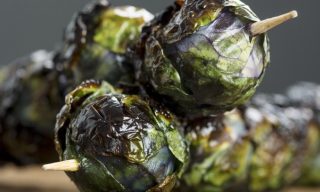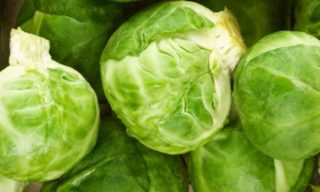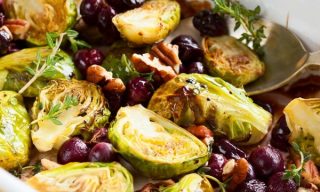Brussels Sprouts are our second featured CRUCIFEROUS family member in our in-season vegetable series. Even though they’re definitely not the most popular vegetable, they may be your favorite Cruciferous veggie by the end of this post, or at least give them a fair chance.
 If you are making faces at the thought of Brussels sprouts for dinner, you are not alone. A 2008 survey found Brussels sprouts to be the most hated vegetable in America. Today this vegetable has become very trendy, but there are still many Brussels sprouts haters out there.
If you are making faces at the thought of Brussels sprouts for dinner, you are not alone. A 2008 survey found Brussels sprouts to be the most hated vegetable in America. Today this vegetable has become very trendy, but there are still many Brussels sprouts haters out there.
Brussels sprouts are a vegetable that many people are convinced they dislike, perhaps because when they had them years ago they really did smell and taste awful. If that is the case, you should give them another try. The Brussels sprouts being grown today are of much better quality, and as long as they are cooked properly, rather than being overpowering or bitter in taste, they can be quite pleasing to the palate. They may surprise you, just like they have many other former naysayers, and soon may even become perhaps becoming one of your favorite vegetables! See the Brussels sprouts section of the Nutrition Factors library for more information on the proper way to cook Brussels sprouts so you can give them a fair chance next time you try them.
Before we dive into why this underdog Cruciferous vegetable is making a comeback, you may be asking why they’re even called Brussels Sprouts. This vegetable didn’t originate in Brussels but are so named because they were cultivated in large quantities there. The French word for Brussels sprouts is “choux de Bruxelles,” which actually means Brussels cabbage. The name fits. As the plant grows, many mini cabbage heads sprout out from the tall stalk.
Brussels sprouts belong to the cruciferous family of vegetables. Some of the other vegetables in this category are cabbage, broccoli, cauliflower, and kale. The name “cruciferous” comes from the four equal size petals in these vegetables’ flowers that are shaped somewhat like a crucifix. All cruciferous vegetables contain goitrogens, which are generally safe, but could be a concern for some people. If you have a thyroid condition, you should check with your doctor if it is okay for you to include Brussels sprouts and other cruciferous vegetables in your diet.
Brussels Sprouts Nutritional Benefits

Packed into each serving of this tiny vegetable is a powerhouse of nutrition–protein, many essential vitamins and minerals, dietary fiber, and antioxidants. The B vitamins are a great source of energy, while calcium, magnesium, phosphorus, and vitamin K promote healthy bones. Vitamin K is also essential for blood clotting, while heart-healthy magnesium and potassium in Brussels sprouts help regulate blood pressure. Brussels sprouts are a surprisingly great source of vitamin C, too.
Brussels sprouts are also very diet friendly. A generous one cup serving contains only 61 calories, but 4 grams protein and 4 grams dietary fiber. There are heart-healthy Omega-3 fatty acids, too.
But that’s not all. The amazing antioxidant benefits that you also get from adding Brussels sprouts to the diet come from not just one component or a couple, but from many. Vitamins A, C, and E and copper, manganese, the carotenoids beta-carotene, lutein, and zeaxanthin, and other disease-fighting phytochemicals called glucosinolates all work together synergistically to keep your immune system strong and help prevent heart disease, cancer, and other serious inflammation and illnesses.
Brussels Sprouts Season
Brussels sprouts season extends from September to early winter. Although you can probably buy fresh Brussels sprouts in your supermarket year-round, if you attempt to do so during the summer, you may be disappointed. During the warm weather, Brussels sprouts tend to be less tender and somewhat bitter tasting. Brussels sprouts are at their peak during the late part of the fall. They are a hearty, filling vegetable, so they are an excellent choice for cooler weather menus, too. During the off-season, frozen Brussels sprouts are a good alternative.
To learn more about Brussels Sprouts, check out our Nutrition Factors Libary that is packed with tasty tidbits and nutrition facts!
Brussels Sprouts Selection and Storage
 The fresh Brussels sprouts you buy should be firm, evenly sized, and bright green. Avoid any that are soft or whose leaves are wilted or have perforations. Bottoms that are brown, dry, or have yellow patches or a strong sulfur smell are other signs to avoid and an indication of age. Choosing sprouts that are uniform in size is important, too, so they will cook evenly and none will be overcooked. Overcooking will not only smell up your house but deplete this vegetable’s nutrients.
The fresh Brussels sprouts you buy should be firm, evenly sized, and bright green. Avoid any that are soft or whose leaves are wilted or have perforations. Bottoms that are brown, dry, or have yellow patches or a strong sulfur smell are other signs to avoid and an indication of age. Choosing sprouts that are uniform in size is important, too, so they will cook evenly and none will be overcooked. Overcooking will not only smell up your house but deplete this vegetable’s nutrients.
Brussels sprouts have a short shelf life. If you’re not going to eat them immediately, you can place them unwashed in a paper bag and store them in the vegetable compartment of your refrigerator for up to 3 days.
Just before preparing the sprouts to eat, you should wash them under cold water. Waiting until then will help prevent any possible exposure to pesticides while preserving the nutritional content. To be extra safe, consider purchasing organic Brussels sprouts.
Brussels Sprouts Recipes
Brussels sprouts are a very versatile vegetable that works well either as an accompaniment to meat, poultry, fish, cheese, rice or other grains or in a salad. Here are two flavorful recipes from the Nutrition Factors Recipe Database using Brussels sprouts:
Tossed in pure virgin olive oil and roasted to perfection, this recipe is bursting with fall flavor! This Brussels Sprout Salad, which also contains our featured fall fruit, cranberries, is a perfect cozy side dish on a crisp autumn day. Bake fresh cranberries alongside the Brussels sprouts for added seasonal aroma or you can substitute fresh cranberries for the dried cranberries.
 Brussels Sprouts Chicken Caesar Salad
Brussels Sprouts Chicken Caesar Salad
Give your lunch a makeover by adding shredded Brussels sprouts to make the classic Caesar salad like new with a healthy and flavorful spin! You’ll want this filling Brussels Sprouts Chicken Caesar Salad for lunch or as a dinner main course whenever you get the Caesar Salad Craving!

